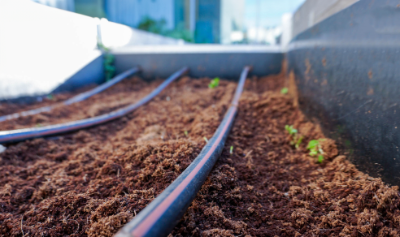Water Conservation
Why is it important?
California is currently experiencing an unprecedented drought caused in part by poor water management practices, changing climate conditions, and increasing water demand. As our population continues to grow, droughts like this will not be rare occurrences—they will become a regular cycle of water shortages unless we change our consumption patterns.
Water is one of the world’s most precious resources, and few places in the U.S. understand this better than Southern California, where demand continues to rise while water supplies decline. According to the Public Policy Institute of California, the state's water needs may increase by as much as 40% in the next 25 years.
Given the urgency of this issue, we cannot afford to waste water. Wasting water not only strains a dwindling resource, but also increases the environmental and financial burden of supplying and treating it. LMU recognizes this challenge and is committed to being a model of responsible water use and environmental stewardship.

What is LMU Doing?
LMU has taken significant strides in implementing reclaimed water systems, reflecting our commitment to pioneering sustainable solutions that can be adopted by the wider community. Our approach to conserving water includes a variety of practices designed to reduce reliance on potable water for non-drinking purposes.
LMU’s leadership in sustainable water usage demonstrates a long-term commitment to environmental stewardship. Through innovative infrastructure, thoughtful landscaping, and collaborative efforts, we continue to protect vital resources while modeling best practices in water conservation.
Reclaimed Water Use
-
Over 70% of LMU’s total water use—57 million gallons annually—comes from recycled water.
-
80% of LMU’s grounds are irrigated with non-potable reclaimed water purchased through LADWP, using a system co-designed by an LMU professor.
-
Recycled water is used for landscaping, toilet flushing, and showering and undergoes a rigorous treatment process to ensure safety and quality.
-
LMU began using recycled water for campus landscape irrigation in 1997, becoming a pioneer in this space within higher education.
-
By using recycled instead of fresh water, LMU ensures potable water is reserved for essential needs, resulting in significant conservation and cost savings.
Sustainable Landscaping
-
210,000 square feet of natural grass was removed from Drollinger Field and replaced with artificial turf, saving an estimated 1 million gallons of water.
-
Turf and high-water-use plants have been replaced with drought-tolerant vegetation.
-
Rainwater and atmospheric condition sensors have been deployed to optimize irrigation.
-
Condensate from rooftop HVAC systems at the Life Sciences Building is collected and reused to irrigate nearby plants.
What Can You Do?
Shower Wisely
Be mindful of the length of your showers. When possible, aim to keep your showers under 5–10 minutes. Low-flow showerheads can also significantly reduce water usage in the shower.
Mindful Dishwashing
Only use your dishwasher when you will be washing a full load. When washing dishes by hand, try filling the basin with water instead of letting the water flow.
Efficient Toilet Use
Low-flow toilets can be very effective at reducing water waste. Furthermore, always dispose of tissues and other waste in the trash instead of flushing them.
Laundry Tips
Only use the laundry machine when you will be washing a full load of clothing. If your machine has the option, adjust the water usage based on load size.
Fix Leaks Promptly
Even small leaks can waste hundreds of gallons of water over time. Regularly check faucets, toilets, and hoses for leaks and repair them quickly.
Turn Off the Tap
Don’t let water run while brushing your teeth, shaving, or washing your hands.